Nicholas P. Cheremisinoff. Handbook of Solid Waste Management and Waste Minimization Technologies
Подождите немного. Документ загружается.

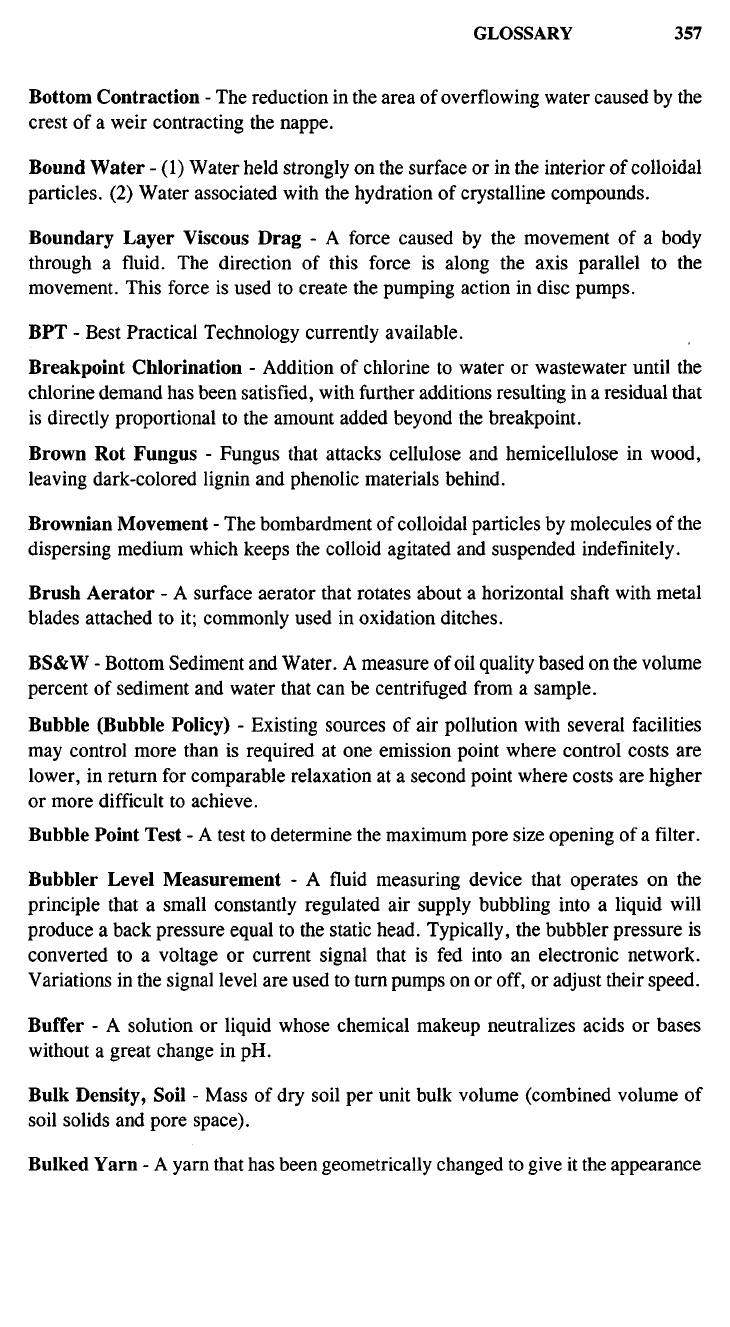
Bottom Contraction - The reduction in the area of overflowing water caused by the
crest of a weir contracting the nappe.
Bound Water - (1) Water held strongly on the surface or in the interior of colloidal
particles. (2) Water associated with the hydration of crystalline compounds.
Boundary Layer Viscous Drag - A force caused by the movement of a body
through a fluid. The direction of this force is along the axis parallel to the
movement. This force is used to create the pumping action in disc pumps.
BPT - Best Practical Technology currently available.
Breakpoint Chlorination - Addition of chlorine to water or wastewater until the
chlorine demand has been satisfied, with further additions resulting in a residual that
is directly proportional to the amount added beyond the breakpoint.
Brown Rot Fungus - Fungus that attacks cellulose and hemicellulose in wood,
leaving dark-colored lignin and phenolic materials behind.
Brownian Movement - The bombardment of colloidal particles by molecules of the
dispersing medium which keeps the colloid agitated and suspended indefinitely.
Brush Aerator - A surface aerator that rotates about a horizontal shaft with metal
blades attached to it; commonly used in oxidation ditches.
BS&W - Bottom Sediment and Water. A measure of oil quality based on the volume
percent of sediment and water that can be centrifuged from a sample.
Bubble (Bubble Policy) - Existing sources of air pollution with several facilities
may control more than is required at one emission point where control costs are
lower, in return for comparable relaxation at a second point where costs are higher
or more difficult to achieve.
Bubble Point Test - A test to determine the maximum pore size opening of a filter.
Bubbler Level Measurement - A fluid measuring device that operates on the
principle that a small constantly regulated air supply bubbling into a liquid will
produce a back pressure equal to the static head. Typically, the bubbler pressure is
converted to a voltage or current signal that is fed into an electronic network.
Variations in the signal level are used to turn pumps on or off, or adjust their speed.
Buffer - A solution or liquid whose chemical makeup neutralizes acids or bases
without a great change in pH.
Bulk Density, Soil - Mass of dry soil per unit bulk volume (combined volume of
soil solids and pore space).
Bulked Yarn - A yarn that has been geometrically changed to give it the appearance
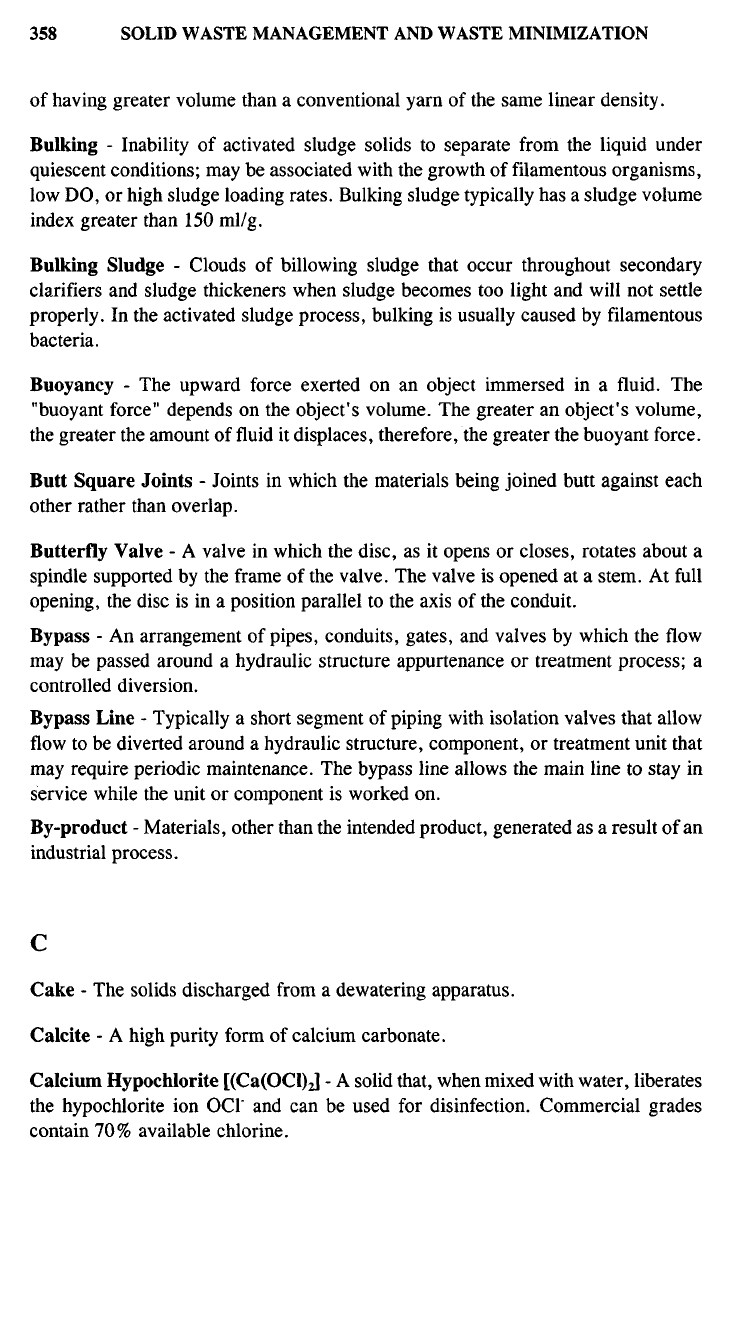
of having greater volume than a conventional yarn of the same linear density.
Bulking - Inability of activated sludge solids to separate from the liquid under
quiescent conditions; may be associated with the growth of filamentous organisms,
low DO, or high sludge loading rates. Bulking sludge typically has a sludge volume
index greater than 150 ml/g.
Bulking Sludge - Clouds of billowing sludge that occur throughout secondary
clarifiers and sludge thickeners when sludge becomes too light and will not settle
properly. In the activated sludge process, bulking is usually caused by filamentous
bacteria.
Buoyancy - The upward force exerted on an object immersed in a fluid. The
"buoyant force" depends on the object's volume. The greater an object's volume,
the greater the amount of fluid it displaces, therefore, the greater the buoyant force.
Butt Square Joints - Joints in which the materials being joined butt against each
other rather than overlap.
Butterfly Valve - A valve in which the disc, as it opens or closes, rotates about a
spindle supported by the frame of the valve. The valve is opened at a stem. At full
opening, the disc is in a position parallel to the axis of the conduit.
Bypass - An arrangement of pipes, conduits, gates, and valves by which the flow
may be passed around a hydraulic structure appurtenance or treatment process; a
controlled diversion.
Bypass Line - Typically a short segment of piping with isolation valves that allow
flow to be diverted around a hydraulic structure, component, or treatment unit that
may require periodic maintenance. The bypass line allows the main line to stay in
service while the unit or component is worked on.
By-product - Materials, other than the intended product, generated as a result of an
industrial process.
C
Cake - The solids discharged from a dewatering apparatus.
Calcite - A high purity form of calcium carbonate.
Calcium Hypochlorite [(Ca(OCl)
2
] - A solid that, when mixed with water, liberates
the hypochlorite ion OCl' and can be used for disinfection. Commercial grades
contain 70% available chlorine.
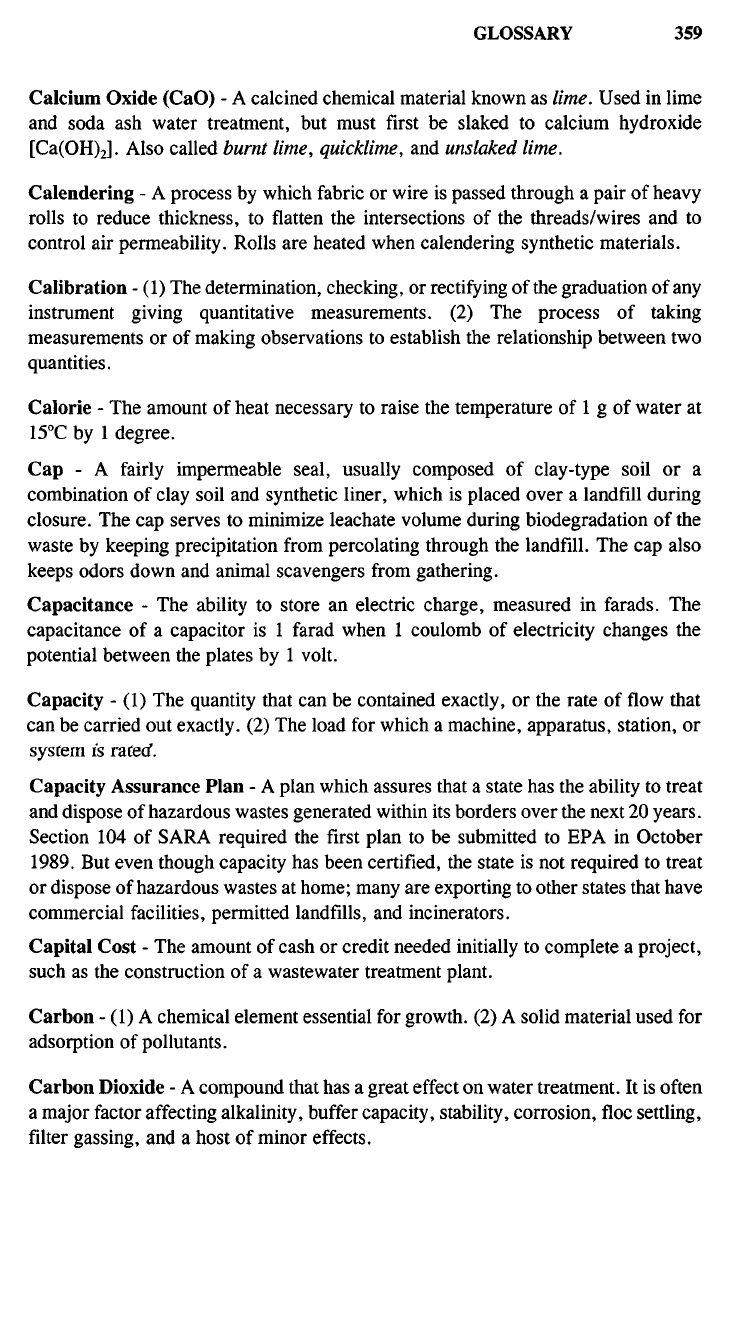
Calcium Oxide (CaO) - A calcined chemical material known as lime. Used in lime
and soda ash water treatment, but must first be slaked to calcium hydroxide
[Ca(OH)
2
].
Also called burnt lime, quicklime, and unslaked lime.
Calendering - A process by which fabric or wire is passed through a pair of heavy
rolls to reduce thickness, to flatten the intersections of the threads/wires and to
control air permeability. Rolls are heated when calendering synthetic materials.
Calibration - (1) The determination, checking, or rectifying of the graduation of any
instrument giving quantitative measurements. (2) The process of taking
measurements or of making observations to establish the relationship between two
quantities.
Calorie - The amount of heat necessary to raise the temperature of 1 g of water at
15
0
C by 1 degree.
Cap - A fairly impermeable seal, usually composed of clay-type soil or a
combination of clay soil and synthetic liner, which is placed over a landfill during
closure. The cap serves to minimize leachate volume during biodegradation of the
waste by keeping precipitation from percolating through the landfill. The cap also
keeps odors down and animal scavengers from gathering.
Capacitance - The ability to store an electric charge, measured in farads. The
capacitance of a capacitor is 1 farad when 1 coulomb of electricity changes the
potential between the plates by 1 volt.
Capacity - (1) The quantity that can be contained exactly, or the rate of flow that
can be carried out exactly. (2) The load for which a machine, apparatus, station, or
system is
ratecf.
Capacity Assurance Plan - A plan which assures that a state has the ability to treat
and dispose of hazardous wastes generated within its borders over the next 20 years.
Section 104 of SARA required the first plan to be submitted to EPA in October
1989.
But even though capacity has been certified, the state is not required to treat
or dispose of hazardous wastes at home; many are exporting to other states that have
commercial facilities, permitted landfills, and incinerators.
Capital Cost - The amount of cash or credit needed initially to complete a project,
such as the construction of a waste water treatment plant.
Carbon -(I)A chemical element essential for growth. (2) A solid material used for
adsorption of pollutants.
Carbon Dioxide - A compound that has a great effect on water treatment. It is often
a major factor affecting alkalinity, buffer capacity, stability, corrosion, floe settling,
filter gassing, and a host of minor effects.
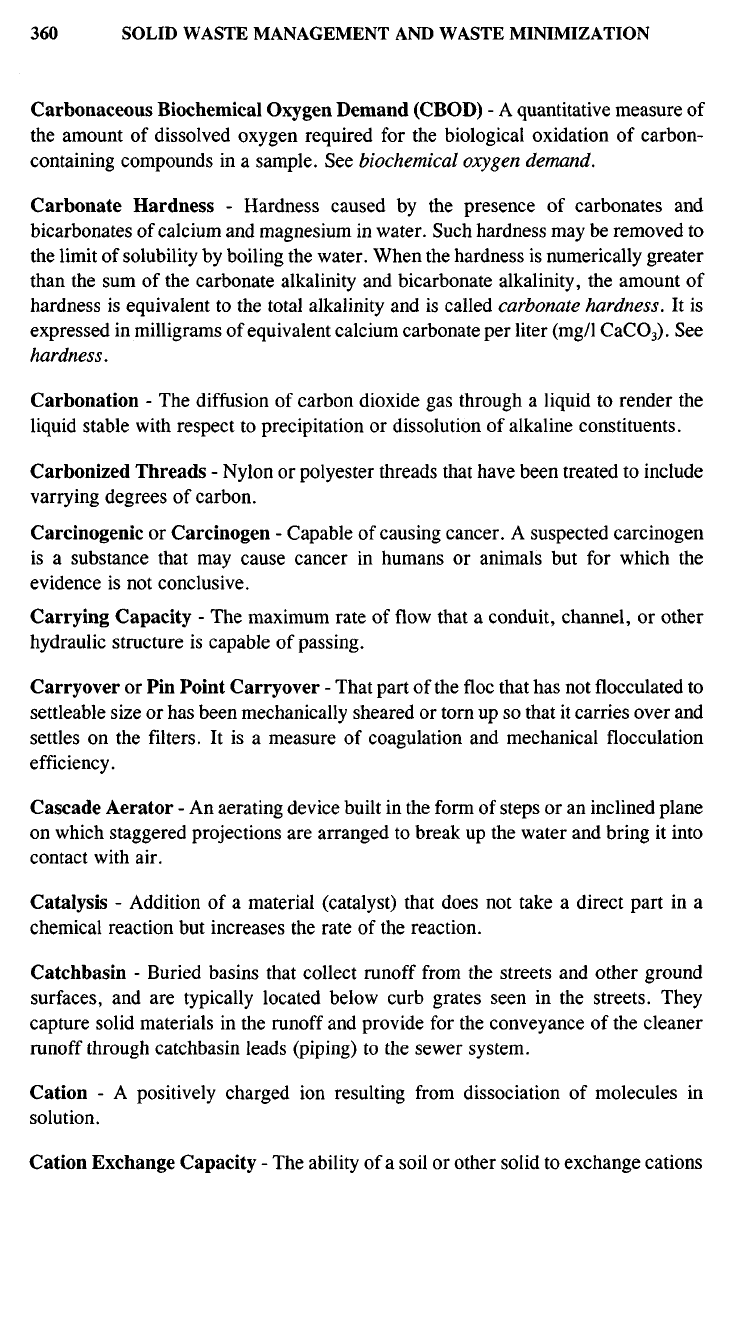
Carbonaceous Biochemical Oxygen Demand (CBOD) - A quantitative measure of
the amount of dissolved oxygen required for the biological oxidation of carbon-
containing compounds in a sample. See biochemical oxygen demand.
Carbonate Hardness - Hardness caused by the presence of carbonates and
bicarbonates of calcium and magnesium in water. Such hardness may be removed to
the limit of solubility by boiling the water. When the hardness is numerically greater
than the sum of the carbonate alkalinity and bicarbonate alkalinity, the amount of
hardness is equivalent to the total alkalinity and is called carbonate hardness. It is
expressed in milligrams of equivalent calcium carbonate per liter (mg/1 CaCO
3
). See
hardness.
Carbonation - The diffusion of carbon dioxide gas through a liquid to render the
liquid stable with respect to precipitation or dissolution of alkaline constituents.
Carbonized Threads - Nylon or polyester threads that have been treated to include
varrying degrees of carbon.
Carcinogenic or Carcinogen - Capable of causing cancer. A suspected carcinogen
is a substance that may cause cancer in humans or animals but for which the
evidence is not conclusive.
Carrying Capacity - The maximum rate of flow that a conduit, channel, or other
hydraulic structure is capable of passing.
Carryover or Pin Point Carryover - That part of the floe that has not flocculated to
settleable size or has been mechanically sheared or torn up so that it carries over and
settles on the filters. It is a measure of coagulation and mechanical flocculation
efficiency.
Cascade Aerator - An aerating device built in the form of steps or an inclined plane
on which staggered projections are arranged to break up the water and bring it into
contact with air.
Catalysis - Addition of a material (catalyst) that does not take a direct part in a
chemical reaction but increases the rate of the reaction.
Catchbasin - Buried basins that collect runoff from the streets and other ground
surfaces, and are typically located below curb grates seen in the streets. They
capture solid materials in the runoff and provide for the conveyance of the cleaner
runoff through catchbasin leads (piping) to the sewer system.
Cation - A positively charged ion resulting from dissociation of molecules in
solution.
Cation Exchange Capacity - The ability of a soil or other solid to exchange cations
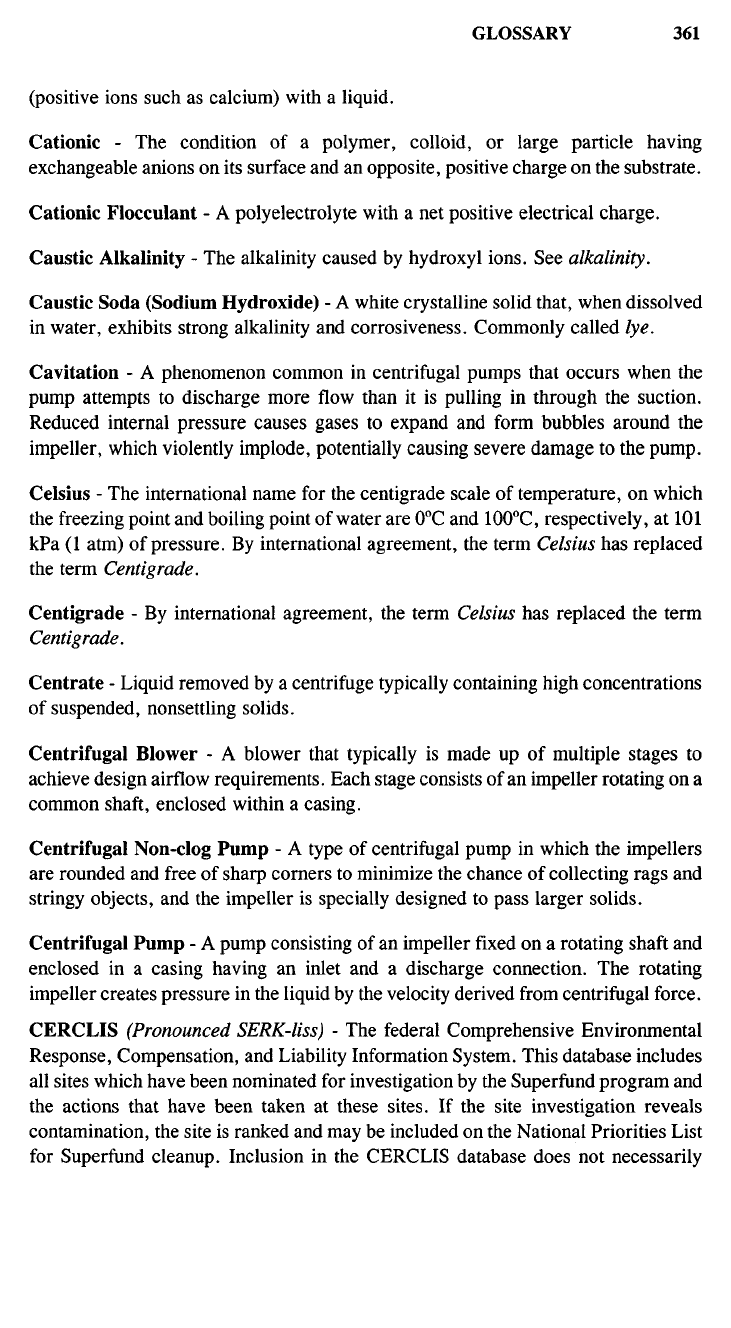
(positive ions such as calcium) with a liquid.
Cationic - The condition of a polymer, colloid, or large particle having
exchangeable anions on its surface and an opposite, positive charge on the substrate.
Cationic Flocculant - A poly electrolyte with a net positive electrical charge.
Caustic Alkalinity - The alkalinity caused by hydroxyl ions. See alkalinity.
Caustic Soda (Sodium Hydroxide) - A white crystalline solid that, when dissolved
in water, exhibits strong alkalinity and corrosiveness. Commonly called lye.
Cavitation - A phenomenon common in centrifugal pumps that occurs when the
pump attempts to discharge more flow than it is pulling in through the suction.
Reduced internal pressure causes gases to expand and form bubbles around the
impeller, which violently implode, potentially causing severe damage to the pump.
Celsius - The international name for the centigrade scale of temperature, on which
the freezing point and boiling point of water are O
0
C and 100
0
C, respectively, at 101
kPa (1 atm) of pressure. By international agreement, the term Celsius has replaced
the term Centigrade.
Centigrade - By international agreement, the term Celsius has replaced the term
Centigrade.
Centrate - Liquid removed by a centrifuge typically containing high concentrations
of suspended, nonsettling solids.
Centrifugal Blower - A blower that typically is made up of multiple stages to
achieve design airflow requirements. Each stage consists of an impeller rotating on a
common shaft, enclosed within a casing.
Centrifugal Non-clog Pump - A type of centrifugal pump in which the impellers
are rounded and free of sharp corners to minimize the chance of collecting rags and
stringy objects, and the impeller is specially designed to pass larger solids.
Centrifugal Pump - A pump consisting of an impeller fixed on a rotating shaft and
enclosed in a casing having an inlet and a discharge connection. The rotating
impeller creates pressure in the liquid by the velocity derived from centrifugal force.
CERCLIS (Pronounced SERK-liss) - The federal Comprehensive Environmental
Response, Compensation, and Liability Information System. This database includes
all sites which have been nominated for investigation by the Superfund program and
the actions that have been taken at these sites. If the site investigation reveals
contamination, the site is ranked and may be included on the National Priorities List
for Superfund cleanup. Inclusion in the CERCLIS database does not necessarily
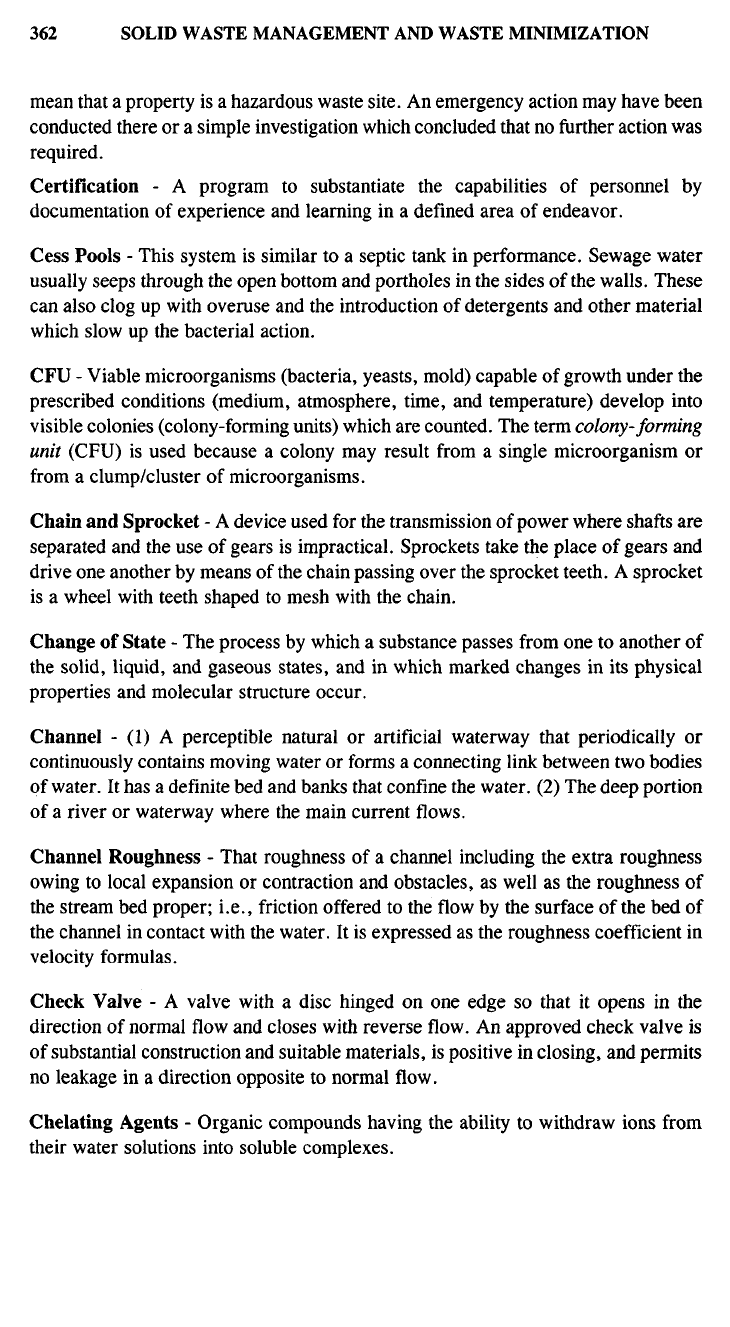
mean that a property is a hazardous waste site. An emergency action may have been
conducted there or a simple investigation which concluded that no further action was
required.
Certification - A program to substantiate the capabilities of personnel by
documentation of experience and learning in a defined area of endeavor.
Cess Pools - This system is similar to a septic tank in performance. Sewage water
usually seeps through the open bottom and portholes in the sides of the walls. These
can also clog up with overuse and the introduction of detergents and other material
which slow up the bacterial action.
CFU - Viable microorganisms (bacteria, yeasts, mold) capable of growth under the
prescribed conditions (medium, atmosphere, time, and temperature) develop into
visible colonies (colony-forming units) which are counted. The term colony-forming
unit (CFU) is used because a colony may result from a single microorganism or
from a clump/cluster of microorganisms.
Chain and Sprocket - A device used for the transmission of power where shafts are
separated and the use of gears is impractical. Sprockets take the place of gears and
drive one another by means of the chain passing over the sprocket teeth. A sprocket
is a wheel with teeth shaped to mesh with the chain.
Change of State - The process by which a substance passes from one to another of
the solid, liquid, and gaseous states, and in which marked changes in its physical
properties and molecular structure occur.
Channel - (1) A perceptible natural or artificial waterway that periodically or
continuously contains moving water or forms a connecting link between two bodies
of water. It has a definite bed and banks that confine the water. (2) The deep portion
of a river or waterway where the main current flows.
Channel Roughness - That roughness of a channel including the extra roughness
owing to local expansion or contraction and obstacles, as well as the roughness of
the stream bed proper; i.e., friction offered to the flow by the surface of the bed of
the channel in contact with the water. It is expressed as the roughness coefficient in
velocity formulas.
Check Valve - A valve with a disc hinged on one edge so that it opens in the
direction of normal flow and closes with reverse flow. An approved check valve is
of substantial construction and suitable materials, is positive in closing, and permits
no leakage in a direction opposite to normal flow.
Chelating Agents - Organic compounds having the ability to withdraw ions from
their water solutions into soluble complexes.
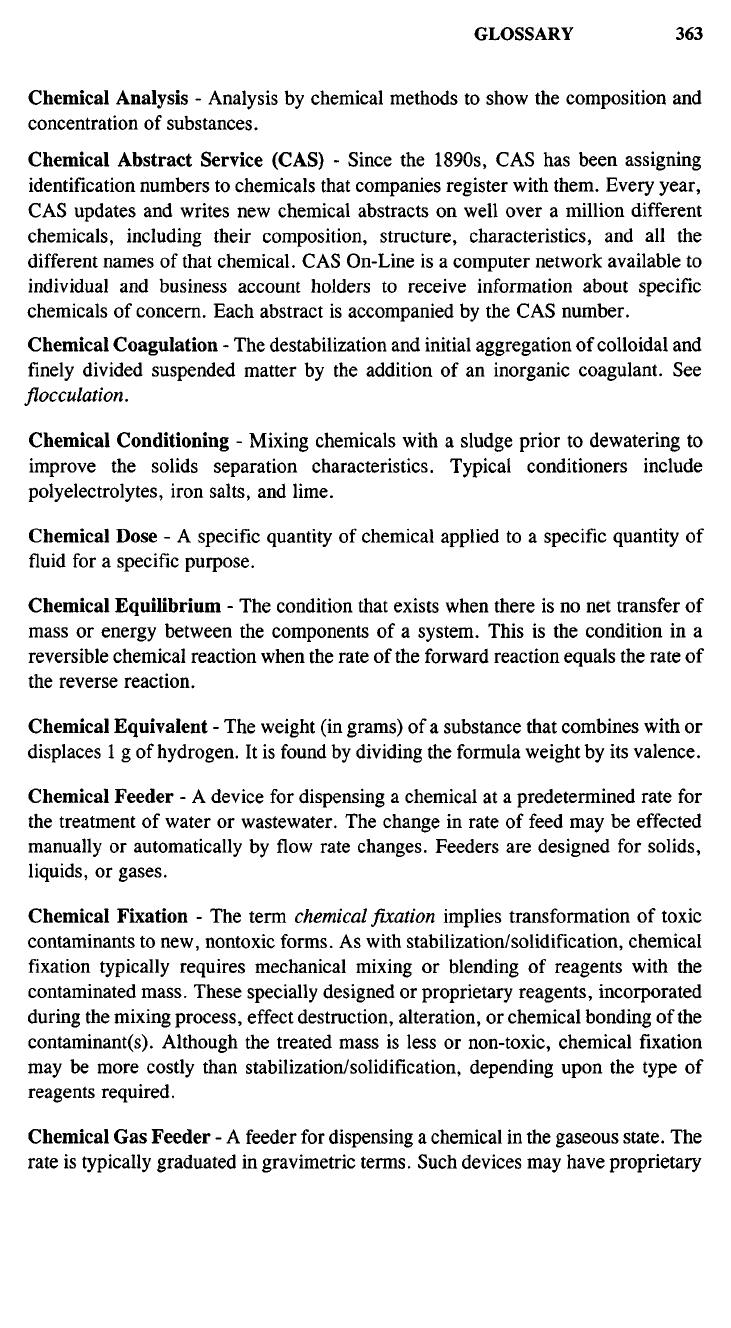
Chemical Analysis - Analysis by chemical methods to show the composition and
concentration of substances.
Chemical Abstract Service (CAS) - Since the 1890s, CAS has been assigning
identification numbers to chemicals that companies register with them. Every year,
CAS updates and writes new chemical abstracts on well over a million different
chemicals, including their composition, structure, characteristics, and all the
different names of that chemical. CAS On-Line is a computer network available to
individual and business account holders to receive information about specific
chemicals of concern. Each abstract is accompanied by the CAS number.
Chemical Coagulation - The destabilization and initial aggregation of colloidal and
finely divided suspended matter by the addition of an inorganic coagulant. See
flocculation.
Chemical Conditioning - Mixing chemicals with a sludge prior to dewatering to
improve the solids separation characteristics. Typical conditioners include
poly electrolytes, iron salts, and lime.
Chemical Dose - A specific quantity of chemical applied to a specific quantity of
fluid for a specific purpose.
Chemical Equilibrium - The condition that exists when there is no net transfer of
mass or energy between the components of a system. This is the condition in a
reversible chemical reaction when the rate of the forward reaction equals the rate of
the reverse reaction.
Chemical Equivalent - The weight (in grams) of a substance that combines with or
displaces 1 g of hydrogen. It is found by dividing the formula weight by its valence.
Chemical Feeder - A device for dispensing a chemical at a predetermined rate for
the treatment of water or wastewater. The change in rate of feed may be effected
manually or automatically by flow rate changes. Feeders are designed for solids,
liquids, or gases.
Chemical Fixation - The term chemical fixation implies transformation of toxic
contaminants to new, nontoxic forms. As with stabilization/solidification, chemical
fixation typically requires mechanical mixing or blending of reagents with the
contaminated mass. These specially designed or proprietary reagents, incorporated
during the mixing process, effect destruction, alteration, or chemical bonding of the
contaminant(s). Although the treated mass is less or non-toxic, chemical fixation
may be more costly than stabilization/solidification, depending upon the type of
reagents required.
Chemical Gas Feeder - A feeder for dispensing a chemical in the gaseous state. The
rate is typically graduated in gravimetric terms. Such devices may have proprietary
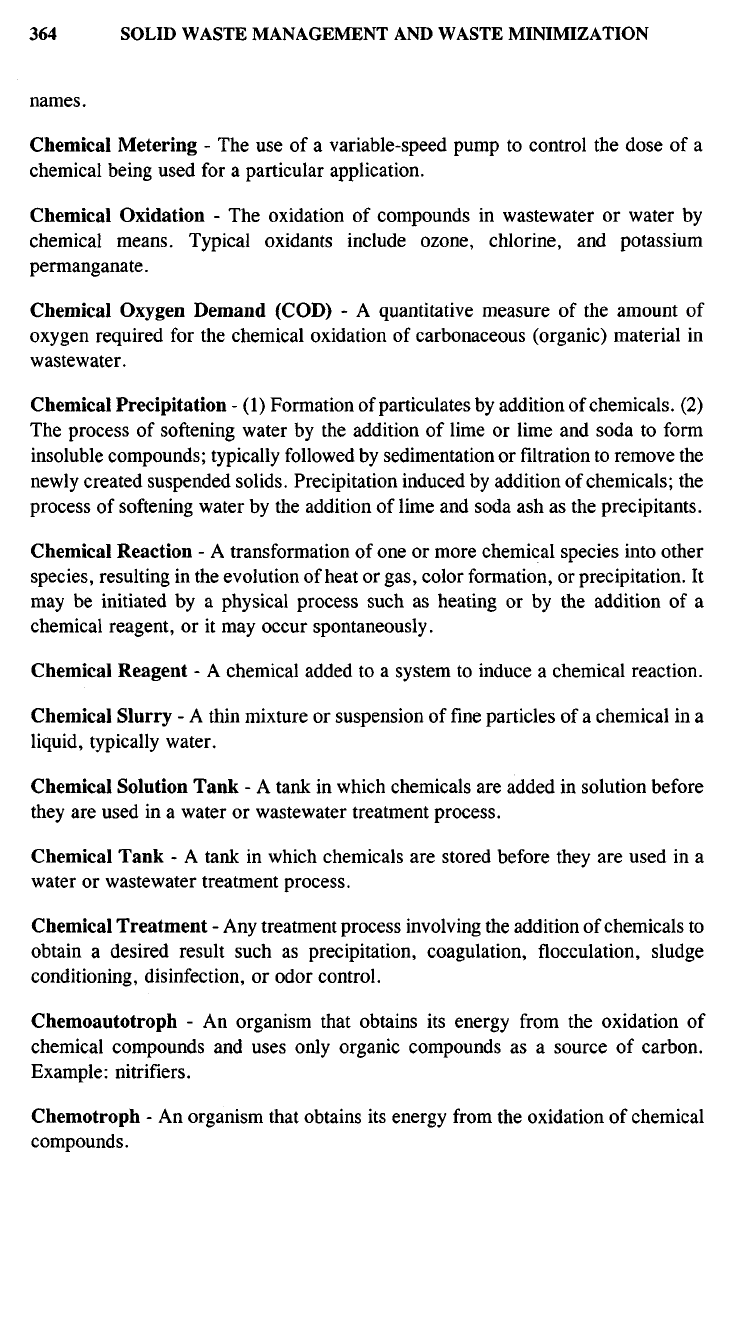
names.
Chemical Metering - The use of a variable-speed pump to control the dose of a
chemical being used for a particular application.
Chemical Oxidation - The oxidation of compounds in wastewater or water by
chemical means. Typical oxidants include ozone, chlorine, and potassium
permanganate.
Chemical Oxygen Demand (COD) - A quantitative measure of the amount of
oxygen required for the chemical oxidation of carbonaceous (organic) material in
wastewater.
Chemical Precipitation - (1) Formation of particulates by addition of chemicals. (2)
The process of softening water by the addition of lime or lime and soda to form
insoluble compounds; typically followed by sedimentation or filtration to remove the
newly created suspended solids. Precipitation induced by addition of chemicals; the
process of softening water by the addition of lime and soda ash as the precipitants.
Chemical Reaction - A transformation of one or more chemical species into other
species, resulting in the evolution of heat or gas, color formation, or precipitation. It
may be initiated by a physical process such as heating or by the addition of a
chemical reagent, or it may occur spontaneously.
Chemical Reagent - A chemical added to a system to induce a chemical reaction.
Chemical Slurry - A thin mixture or suspension of fine particles of a chemical in a
liquid, typically water.
Chemical Solution Tank - A tank in which chemicals are added in solution before
they are used in a water or wastewater treatment process.
Chemical Tank - A tank in which chemicals are stored before they are used in a
water or wastewater treatment process.
Chemical Treatment - Any treatment process involving the addition of chemicals to
obtain a desired result such as precipitation, coagulation, flocculation, sludge
conditioning, disinfection, or odor control.
Chemoautotroph - An organism that obtains its energy from the oxidation of
chemical compounds and uses only organic compounds as a source of carbon.
Example: nitrifiers.
Chemotroph - An organism that obtains its energy from the oxidation of chemical
compounds.
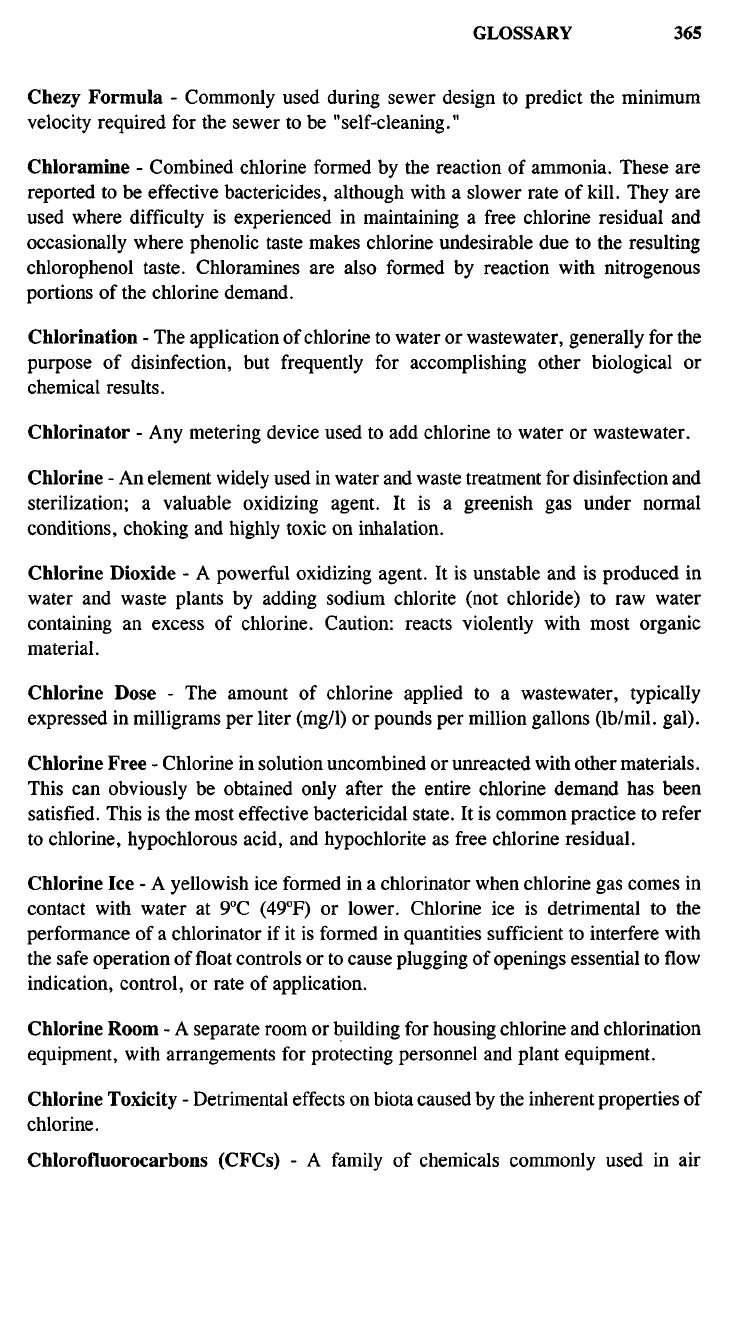
Chezy Formula - Commonly used during sewer design to predict the minimum
velocity required for the sewer to be "self-cleaning."
Chloramine - Combined chlorine formed by the reaction of ammonia. These are
reported to be effective bactericides, although with a slower rate of kill. They are
used where difficulty is experienced in maintaining a free chlorine residual and
occasionally where phenolic taste makes chlorine undesirable due to the resulting
chlorophenol taste. Chloramines are also formed by reaction with nitrogenous
portions of the chlorine demand.
Chlorination - The application of chlorine to water or wastewater, generally for the
purpose of disinfection, but frequently for accomplishing other biological or
chemical results.
Chlorinator - Any metering device used to add chlorine to water or wastewater.
Chlorine - An element widely used in water and waste treatment for disinfection and
sterilization; a valuable oxidizing agent. It is a greenish gas under normal
conditions, choking and highly toxic on inhalation.
Chlorine Dioxide - A powerful oxidizing agent. It is unstable and is produced in
water and waste plants by adding sodium chlorite (not chloride) to raw water
containing an excess of chlorine. Caution: reacts violently with most organic
material.
Chlorine Dose - The amount of chlorine applied to a wastewater, typically
expressed in milligrams per liter (mg/1) or pounds per million gallons (lb/mil. gal).
Chlorine Free - Chlorine in solution uncombined or unreacted with other materials.
This can obviously be obtained only after the entire chlorine demand has been
satisfied. This is the most effective bactericidal state. It is common practice to refer
to chlorine, hypochlorous acid, and hypochlorite as free chlorine residual.
Chlorine Ice - A yellowish ice formed in a chlorinator when chlorine gas comes in
contact with water at 9
0
C (49
0
F) or lower. Chlorine ice is detrimental to the
performance of a chlorinator if it is formed in quantities sufficient to interfere with
the safe operation of float controls or to cause plugging of openings essential to flow
indication, control, or rate of application.
Chlorine Room - A separate room or building for housing chlorine and chlorination
equipment, with arrangements for protecting personnel and plant equipment.
Chlorine Toxicity - Detrimental effects on biota caused by the inherent properties of
chlorine.
Chlorofluorocarbons (CFCs) - A family of chemicals commonly used in air
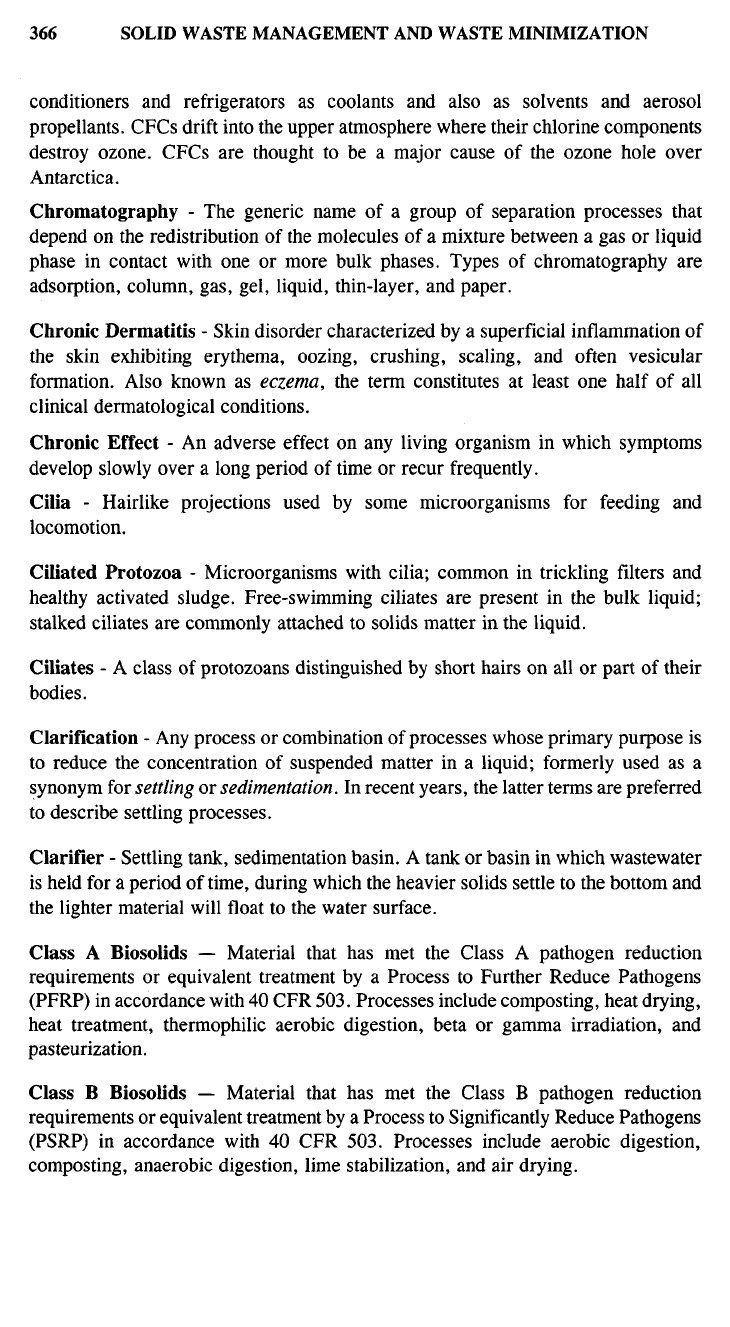
conditioners and refrigerators as coolants and also as solvents and aerosol
propellants. CFCs drift into the upper atmosphere where their chlorine components
destroy ozone. CFCs are thought to be a major cause of the ozone hole over
Antarctica.
Chromatography - The generic name of a group of separation processes that
depend on the redistribution of the molecules of a mixture between a gas or liquid
phase in contact with one or more bulk phases. Types of chromatography are
adsorption, column, gas, gel, liquid, thin-layer, and paper.
Chronic Dermatitis - Skin disorder characterized by a superficial inflammation of
the skin exhibiting erythema, oozing, crushing, scaling, and often vesicular
formation. Also known as eczema, the term constitutes at least one half of all
clinical dermatological conditions.
Chronic Effect - An adverse effect on any living organism in which symptoms
develop slowly over a long period of time or recur frequently.
Cilia - Hairlike projections used by some microorganisms for feeding and
locomotion.
Ciliated Protozoa - Microorganisms with cilia; common in trickling filters and
healthy activated sludge. Free-swimming ciliates are present in the bulk liquid;
stalked ciliates are commonly attached to solids matter in the liquid.
Ciliates - A class of protozoans distinguished by short hairs on all or part of their
bodies.
Clarification - Any process or combination of processes whose primary purpose is
to reduce the concentration of suspended matter in a liquid; formerly used as a
synonym for settling or sedimentation. In recent years, the latter terms are preferred
to describe settling processes.
Clarifier - Settling tank, sedimentation basin. A tank or basin in which wastewater
is held for a period of time, during which the heavier solids settle to the bottom and
the lighter material will float to the water surface.
Class A Biosolids — Material that has met the Class A pathogen reduction
requirements or equivalent treatment by a Process to Further Reduce Pathogens
(PFRP) in accordance with 40 CFR 503. Processes include composting, heat drying,
heat treatment, thermophilic aerobic digestion, beta or gamma irradiation, and
pasteurization.
Class B Biosolids — Material that has met the Class B pathogen reduction
requirements or equivalent treatment by a Process to Significantly Reduce Pathogens
(PSRP) in accordance with 40 CFR 503. Processes include aerobic digestion,
composting, anaerobic digestion, lime stabilization, and air drying.
